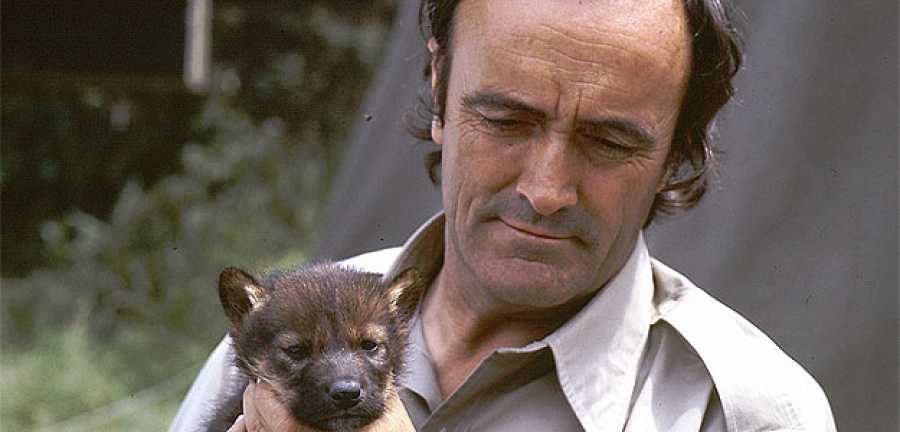
Last 14 March marked the 40th anniversary of the tragic death of Félix Rodríguez de la Fuente, one of the saddest days of my childhood. The man who managed to bring the whole family together in front of the TV once a week to tell us about nature, in his program entitled “El hombre y la Tierra”, was killed tragically in an airplane accident in Alaska.
“This would be a beautiful place to die!,” he is reputed to have said before boarding the plane. It was his 52nd birthday; but it wasn’t a case of the man dying and the myth living on; in fact, he was already a legend: the human animal, an educator who raised environmental awareness in several generations, in a whole country.
Four decades later, his legacy is even greater. Through hundreds of hours of documentaries, radio programs, books, etc., he pioneered environmentalism and become the top name in ethology in our collective memory in Spain.

Apart from his extensive knowledge of the five kingdoms of living things, how did Félix communicate so effectively? How did he address several generations simultaneously? What skills did he use to make himself understood by a broad audience?
The fact is that Félix shattered one of the classic rules of communication, journalism and marketing: adapt the message to the target audience. He spoke in his own words, combining plain language with often complex technical terms. It didn’t matter. Everyone understood him. He reached everybody, regardless of age or station.
One of the most authoritative sources on the issue is Odile, his youngest daughter, who is keeping his passion alive. She recently published a book entitled Félix. Un hombre en la tierra.
With the enthusiasm of someone who enjoys what they do and the talent of making complex things appear simple, Odile summarized the ten rules for effective communication.
- Study your subject in depth, but don’t try to have an opinion on everything. Check and cite your sources, since other people know more than you. Once you understand an issue, talk about it spontaneously, in your own words, always speaking from the heart.
- The power of the tale hinges on experience. Pure book learning is not enough. You must go out, visit the countryside, obtain real experiences, not just read about them. Authenticity lies in sensations, perceptions and emotions.
- Don’t flee from complexity — enjoy it! Easy discourse is one of our faults. A simplistic polarisation between good and bad. Reality and humanity are complex. Details enhance the narrative. Explain climate change by making it accessible, with stories and morals that are easy to capture, and that people can reflect on.
- Be yourself; don’t be nervous; and be open to constructive criticism. Empower your audience; don’t make it all about you. Question your message, without dogmas, because this humanizes your message and your sincere search to be yourself.
- Find common ground with your audience, and avoid extreme positions. Contradictions add value to the complexity of the issues. For example, saving wolves from extinction and enabling them to live in harmony with humans in nature involves managing a conflict with numerous variables and viewpoints.
- Don’t confine yourself to the symptoms of a problem — get to the source. Did Homo sapiens break away from the environment in order to subjugate it? Is that the source of our loneliness and emptiness? Inspire based on enthusiasm — don’t force people to follow you. Invite people to understand you, to become part of the solution. We all want to belong to something greater than ourselves.
- Avoid jargon, and probe below the surface. Integrate technical terms into your discourse, camouflage them, so as to bring out the moral. Become a shaman of your tribe, while making room for others to participate and find their own solutions. Encourage thinking outside the box — it’s green philosophy.
- By focusing only on conflict, you merely fuel antagonism. You must look beyond the problem, turn it around 180 degrees. Climate change is a great opportunity, because we are living in an atmosphere of change. We need all our creativity to meet the challenges.
- Faced with destructive criticism or a hostile question, redirect the message where you want to go. Getting bogged down in conflict does not serve your ultimate goal. If you feel attacked, raise the level of the conversation to the truly momentous issues you want to disclose.
- Eliminate the distance between you and the parties with which you are engaging. In order for listeners to actually hear you, they must feel To inspire and empower others, not only must you avoid dogmatism — you must also treat the others as intelligent people who are capable of debating. We appreciate being told what is not evident.
In conclusion, just as the Ten Commandments that Moses received on Mount Sinai can be summarized in just two, Odile notes that “in order to create a magical connection in the process of communication, you must dilute yourself in the group.”
These concepts are applicable not only to environmental communication but to any other professional discipline, including our personal, family or tribal relationships. In fact, isn’t creating an emotional space to which others want to belong the fundamental goal of every good educator?





There are no comments yet